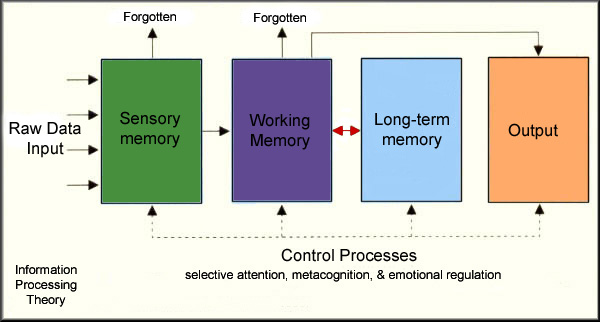|
Changes in Information Processing
Ψ Though most of our intellectual abilities increase or remain stable throughout early and middle adulthood, once beyond the age of 60 everyone experiences a decline in all of our five primary mental abilities.
Ψ Five Primary Mental Abilities
• Verbal Meaning
• Spatial Orientation
• Inductive Reasoning
• Number Ability
• Word Fluency
|
Ψ Although thinking processes become slower & less sharp once a person reaches late adulthood, there is much individual variation in these declines, & each particular cognitive ability shows a different range of age-related decline for each separate individual.
Sensory Register

- Senescence causes relatively small decline in the sensitivity & power of the brain's capacity of the sensory register. To overcome this small decline one can use techniques such as asking others to speak slowly or by looking longer or more intently at a significant image.
- BUT for information to register in the first place it must cross the sensory threshold. This means that our sensory systems have to detect relevant sensations (which dull over time) from stimuli and this is where a decline in input can and will occur as we mature into our late adulthood.
- Thus, while sensory register itself declines only a small amount, the decline in sensory acuity can be large.
Working (short-term) Memory

Remember that working memory has two interrelated functions:
- Temporarily stores information so it can be used consciously
- Processes information that is currently in conscious mind using integrative reasoning, mental calculations, and drawing of inferences
With working memory its capacity for storage and processing in late adulthood produces a noticeable decrease, more than any previous biosocial stage. One reason for this loss is that processing takes longer with age.
Increased demands on the information-processing capacity, whether cause by the complexity of the task or by distractions, strain the working memory of older adults, thus making working memory the most substantial decline with age.
Long-Term Memory: Linking Input & Output

Remember that knowledge base is the storehouse of al the information ever put into memory
So what happens to the knowledge base with old age?
- When groups of older and younger adults are asked to recall something specific (historical
events or something recently learned) the younger adults usually performed better.
- This coincides with accumulated research, that long-term as well as short-term memory are
diminished in older adults
Memory takes two distinct forms (each originating in a different area of the brain)
- Explicit Memory = memory that is easy to retrieve, usually with words. Most explicit memory involves consciously learned words, data, and concepts.
- Implicit Memory = unconscious or automatic memory that is usually stored via habits, emotional responses, routine procedures, and various sensations.
For the most part, contents of implicit memory are never deliberately memorized for later recall.
Implicit memory is much less vulnerable to age-related deficits, this is partly related to automaticity. Once behavior becomes well-learned, it becomes automatic and routine, easy to access when needed in context but beyond the verbal command of explicit memory.
Most traditional long-term memory tests focus on explicit memory, failing to take into account the substantial implicit memory that an older adult might have.
Other Aspects of Cognition

Control processes are ways people use their intellectual powers; however, with older adults they seem less efficient at managing control processes, especially decision making. Older adults seem to prefer NOT to gather and consider all relevant data, but instead rely on prior knowledge, general principles, or even rules of thumb.
Two possible reasons of the decline in control processes are either that the aging brain is less capable of strategizing the best use of mental ability OR that older people do not know how to organize, memorize, and analyze information as they once did.
"Top-down" strategy is using deductive rather than inductive reasoning" Given a diagnosis of cancer, older adults are more likely to arrive at a treatment decision with out getting a second opinion or seeking further information on medical opinions, benefits, and risks."
The "Tip-of-the-tongue" experience becomes more common with age, usually beginning as early as the late 30's, but it is the strategies for retrieval when having this phenomenon that worsens with age.
|
















